Rewire your brain for superhuman productivity- a step by step guide.
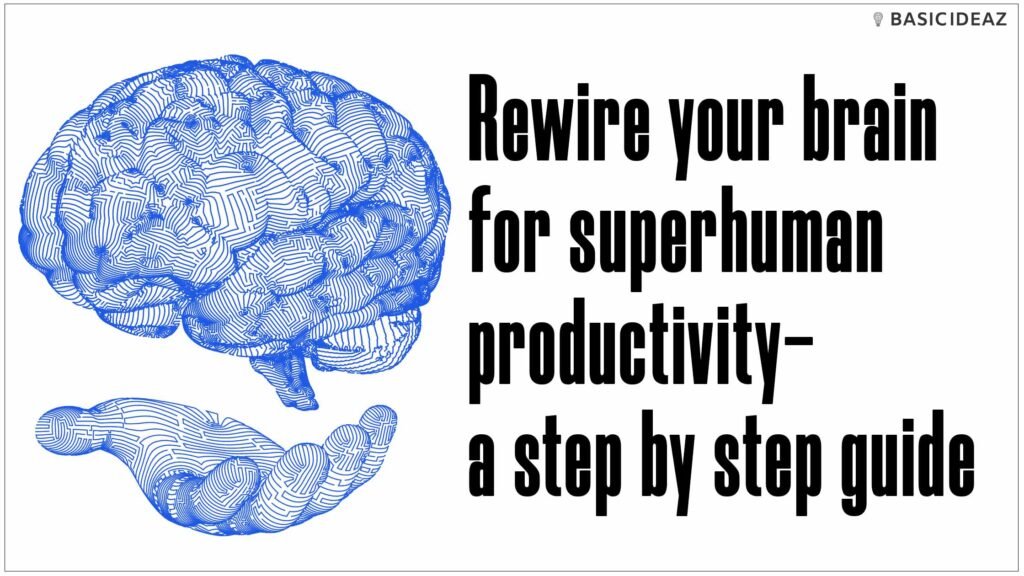
I am not only going to tell you how to rewire your brain but also give you authentic techniques and tricks to rewire your brain to become a productivity ninja.
If you read the full article with patience, you will see a significant impact on your thinking, which will create new and better directions for your life.
This is what you are going to learn:
Design Mentality – A perspective shift
-Motivation
-Willpower
The whole process to rewire your brain is shown in the below infographic

Let’s begin-
Understanding Neuroplasticity
Our brain is not a fixed machine but a changeable ‘muscle.’ Our life experiences shape and organizes our brains. It physically changes through our activities.
Our brain is primarily made up of neurons, cells, and blood vessels.
Neurons are information messengers. They use electrical impulses and chemical signals to transmit information between different areas of the brain and between the brain and the rest of the nervous system. It is responsible for our thinking, feeling, and doing whatever we want to do.
Have you heard the term, Neurons that fire together, wire together? This is a famous quote from the Canadian psychologist Donald Hebb.
When we do activities like writing, singing, cooking, or playing, some neurons are fired into our brains.
Depending on our activity, neurons that fire into our brains create and strengthen specific connections while other inactive neural connections get weaker.
The neural connections that get stronger and bigger make us more skillful in that particular activity.
This is neuroplasticity.
Neuroplasticity is the brain’s ability to reorganize our brain structure by forming new neural connections and strengthening the the existing one. It is the way our brain gets wired on the things we repeatedly do.
When we repeat something, new connections form and existing connection strengths for which our skill level on that particular activity increases. This is what we call to rewire your brain.
The opposite is also true; when we don’t perform a certain activity for days, the neural connection weakens and becomes dormant.
You are good at walking because you walk every day. If an astronaut comes from space after a few months, he will find it difficult to walk on the earth in the beginning, because his pathways for walking on gravity have shrunk.
The pathways that have been created for a certain activity never completely die off. It can only shrink and become dormant.
Imagine if you have to learn to drive a car every time to take a break from driving. This is why bad habits never go away. Once we start drinking after remaining sober for years, our old connections fire up and start growing like milk bubbles up after a specific temperature.
Based on this information, we can design our mentality that will help us to increase our productivity.
Get Quality Self Improvement Articles Every Week, No Spam, No Ads.
Thank you!
You are added to the community of Basicideaz.
Design mentality – A perspective shift
Have you heard the compound effect?
To rewire your brain, we need to understand the compound effect.
In his book, ‘The compound effect’ by Darren Hardy explains the compound effect in detail. A great book to design your mentality. It will be a perspective shift for the readers.
The compound effect is receiving huge benefits with small practices that I will discuss in the later article.
If you implement small practices in your life and improve yourself by 1% every day, the improvement will not just add up but compound over time.
Let’s understand with an example, Suppose you want to learn guitar.
So, you start committing that you will practice only five minutes every day. This is a small practice.
Five minutes doesn’t seem much. This will fire the neurons as we talked above in your brain and create new connections. It doesn’t matter how weak the connections are.
The next day, you did it again for five minutes and repeated the same behavior for three to four weeks.
Most of the days, you will play for more than five minutes because of your intrinsic motivation, which we will, again, come later to this article.
After two to three weeks, you will find it easy to play for five minutes without much resistance in yourself; this is because the connections are strengthening. When neural connections are strong, we can do that particular activity more easily than before.
You automatically go from five to ten minutes, then ten to thirty minutes, and within a few months, you play thirty to forty minutes a day.
You will say, this is very slow progress. Of course, it is slow, but the compound effect hasn’t started yet.
Once you cross a certain period of time, and when your neural connection strengthens to its core, your productivity will jump.
You will play three to four hours a day after a few years. Is it worth it?
Let’s see the below diagram:

It is after the twentieth month where you start to practice like a maniac. It is after the twentieth month where you begin to see the real changes in you.
After the twentieth month, one day of practice equals one month of practice because you practice more.
You can practice three to four hours because the neural connections are stronger than ever and continuing to get stronger. The ‘rewire your brain‘ concepts speed up in these months. Eventually, you will find you can’t live without playing the guitar. You feel bored and unsatisfied if you don’t play it for a day. Your finger keeps pressing the invisible strings when working in your office or walking on the sidewalk.
This happens because of neuroplasticity.
The biggest problem with this strategy is when your practice hours grow in the future, there comes a time when you feel a burden that you have to practice for that hour to maintain the pace.
And because of that, small practices have some rules. We will discuss it within a few minutes.
Until now, we understand that to rewire your brain, we follow the compound effect, and neural connections will form, leading to forming productive habits that will support us to practice for long hours.
This is easier said than done.
If practicing every day is that easy, nobody would have a depressing life in this world.
This brings to our next point, forming productive habits.
Forming productive habits.
Forming productive habits demands repetition. Repetitions rewire your brains. You can perform an action in two ways.
- Using motivation
- Using willpower
Motivation: When you are motivated, you don’t need the willpower to start your work. If somebody offers you ten grand to finish a project, trust me, you will finish it before the timeline.
When you feel joy by doing something, you don’t need to force yourself to continue it.
Two types of motivation are intrinsic and extrinsic motivation.
Intrinsic motivation is internal motivation; you don’t need any external push to do your work. You feel happy while doing it.
Writing gives you joy, and while writing your novel, you find that internal happiness in you. This is intrinsic motivation.
On the other hand, if you finish your project, you will receive fame and money; this pushes you to work on your project. This is external motivation.
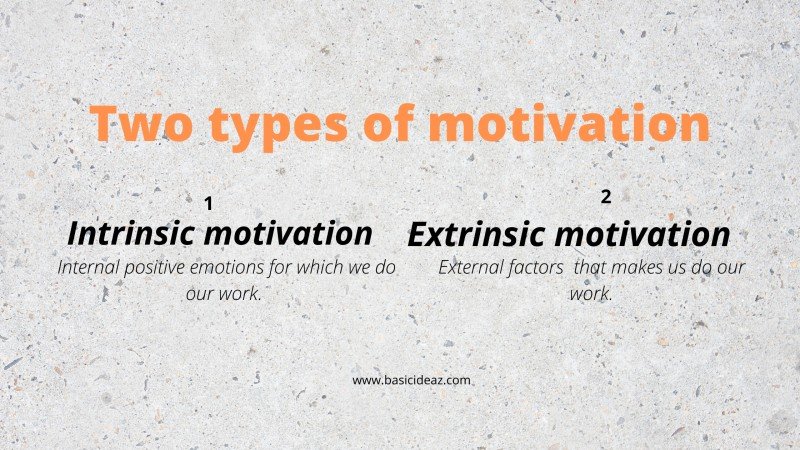
For forming productive habits, we need intrinsic motivation. Every day, we will not find that external push to do our work.
The biggest problem with motivation is, it doesn’t show up every day.
Someday we feel motivated to do our work, and someday we don’t feel like doing anything.
If you are relying on motivation, to get started your work, you are doomed.
This is the main reason why a lot of people fail in their commitment to reduce weight, to write a novel, or to learn a musical instrument.
After a few days of practice, when the motivation wears off, you just don’t feel like working anymore.
We rely on the following strategy:-
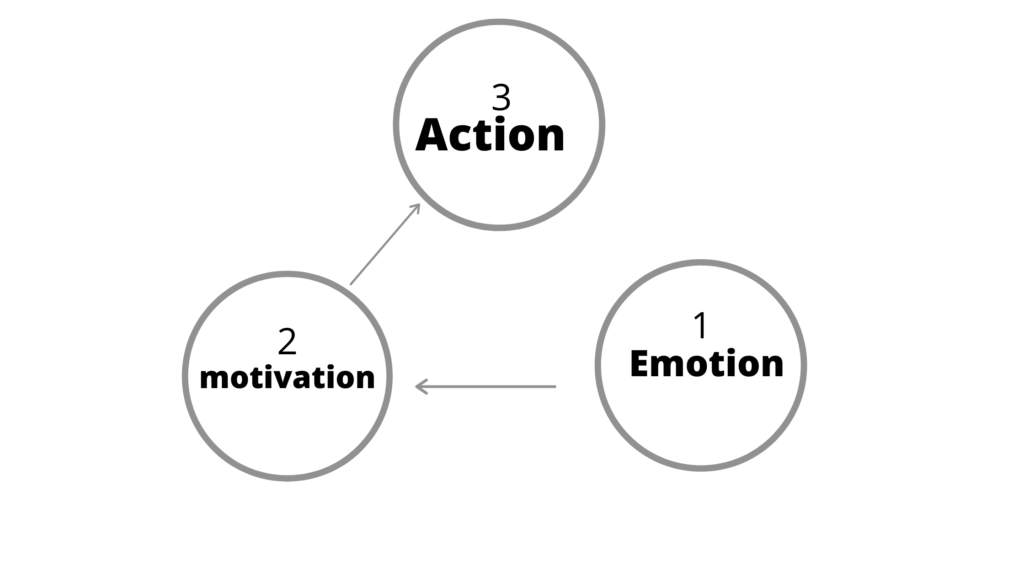
When we feel good about ourselves, we feel motivated. Because of motivation, we act on our project.
You are happy today, and you are feeling good about yourself, so you go to the gym for a good workout.
When you are depressed and sad, it will be very difficult to start your work. There is just no motivation to work.
So, when there is no motivation, chances are you will skip the day, which hinders in developing your productive habit.
Interestingly, studies show action stirs emotions. If you act on something, like playing your guitar, feel good about it, and 2/3rd of the time, people continue to practice more.
This connects the missing link in the above figure:

This proves that to form productive habits, relying on motivation is a bad idea. Instead of relying on motivation to show up, if we start with action, we will stir our emotions, which eventually brings back the missing intrinsic motivation for the day.
But the question is, how to act if there is no motivation in the first place.
Here comes our friend willpower.
Willpower: I know what you are going to say. I don’t have willpower. My willpower is weak.
The willpower you have is more than enough to form productive habits. This is where our main key point of this article comes: small practices.
Get Quality Self Improvement Articles Every Week, No Spam, No Ads.
Thank you!
You are added to the community of Basicideaz.
The power of Small practices
The small practice, also known as mini habits, tiny habits, or atomic habits, as mentioned in the Jamesclear book, “atomic habits.”
The basic concept of small practices is that instead of planning on longer and bigger practices, we will focus on small practices.
Instead of doing 50 push-ups a day, if we commit to doing only four or five push-ups, that commitment will be effortless to follow.
Whenever there is no motivation to do push-ups, we can use our willpower to do four or five push-ups.
Instead of writing, 2000 words a day, if we commit to writing 50 words a day, we will be more likely to follow our commitment.
This is because five push-ups or 50 words don’t take much of your willpower.
Your willpower is limited for the day, and the more you use it, it depletes over time.
Doing small practices doesn’t take much of your willpower; it will, as discussed above, force you to take action. When you take action, emotion stirs, and then comes the intrinsic motivation.
When you have intrinsic motivation, you don’t need willpower.
Someday, you will not feel like writing at all, after writing for 50 words. In those days, you cannot do anything, no matter how much you use your willpower to begin. This happens at the starting phase of forming habits.
It’s okay to miss a day, but not two days in a row while forming productive habits. ‘Rewire your brain’ demands repetition, and if you miss days in a row, that again weakens your neural paths and breaks the existing connections.
This is the reason why we can break bad habits. If we don’t practice certain bad habits for days, the connection weakens over time and becomes dormant.
When the connection weakens, it becomes easy to control our bad habits.
If you don’t feel like writing more, just let it go, at least you wrote 50 words and maintained the streak. That is going to help you for the next day.
By doing small practices, there comes a time when we find the momentum. This changes everything about you.
Momentum
You can rewire your brain much faster when you find momentum.
Momentum can be explained in two senses—narrower and broader sense.
When we don’t feel like doing work, but we start with small practices, we stir up emotions, which leads to intrinsic motivation, which eventually leads to bonus work.
The bonus work is nothing but momentum.
Most of the time, we start with 50 words but end up writing 1000 words. The additional 950 words are because of momentum,
This is in a narrower sense.
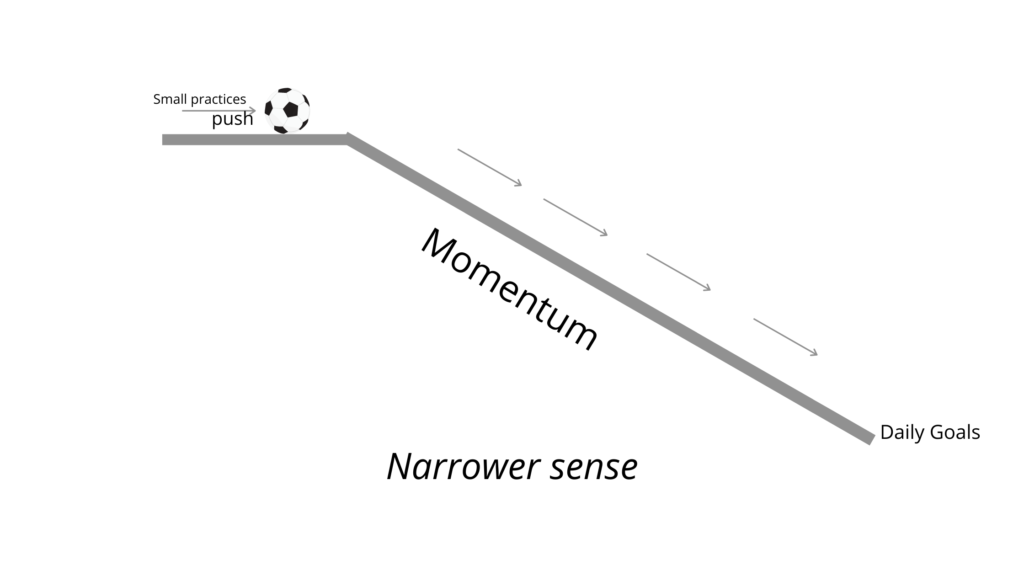
The broader sense is our life goals.
Remember, above I said, there comes a time when you play guitar for four hours a day. That is momentum.
Going to the gym every day and having a good workout for two to three hours is momentum.
Your company earns in millions every day, that is momentum.
Your youtube account gets crazy subscribers every day, that is momentum.
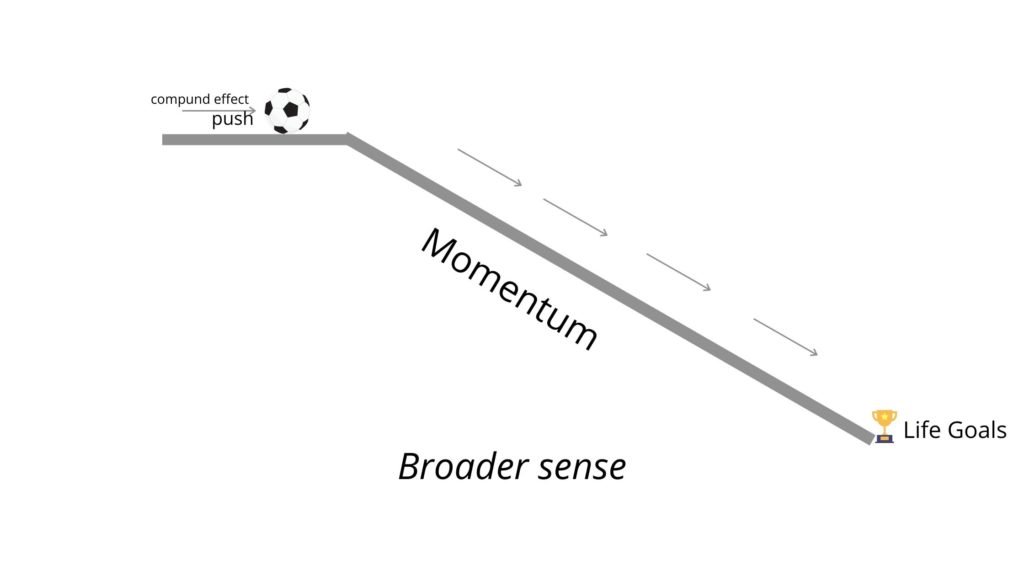
Momentum shows up in your life when you are consistent. You are consistent because of small practices.
This broader sense of momentum comes after a certain period of time. It doesn’t show up in the beginning.
Once you find your momentum, you even cannot stop yourself from succeeding in life.
There is a big pitfall in the small practice, which most of us neglect or miss while following this strategy.
This is when we focus on small practice; our working hours increase over time, which burdens our minds, which eventually leads to failure.
Let’s understand this with the guitar practices.
Suppose you are playing your guitar for a few months, and because of the understanding of compound effects, you increase your practice session week by week or maybe month by month.
There will come a time when you will practice over an hour every day. For you, your small practice has increased to one hour.
No matter how much rewiring your brain has done for playing guitar, there will be days when you will not find the motivation to play it anymore, and you also cannot use your willpower because your small practice is not small anymore. It is four hours, not five minutes.
You have to have more energy and willpower to do the practice session. You will fail most of the time, and this will lead to dissatisfaction.
Your goal is one hour, and when you are unable to meet that goal, no matter if you practice thirty or forty minutes by using your willpower, you will not be satisfied.
Your satisfaction comes when you meet your goal. Your emotions stir when you have a sense of completion. This is the basic reason for intrinsic motivation.
Because of this, there are certain rules in small practices:
Rules of small practices
1. Never increase your small practice session:
I know what you are thinking. If you don’t increase, how will I get my compound effect?
You will get your compound effect by bonus practices. Your bonus practices will increase over time.
For example, your goal today is 50 words. You wrote 50 words, and you found momentum to write more. You write like 1000 words without any flow of disturbance because that is your comfort zone.
But after 1000 words, you don’t feel like writing anymore because you are now out of your comfort zone.
This is where small practices again come in. After writing 1000 words, just write 50 words more by using your willpower—50 words is just a tiny paragraph.
Within a few days, 1050 words will become your comfort zone.
I hope you got the idea.
Focus on bonus practices, if you fail on bonus practices, there is nothing to worry, because your primary 50 words you have written and that will give you satisfaction and a sense of completion.
2. Never cheat on small practices: Writing one word is too small to stir your emotion. Doing one push up is too small to stir your emotion. This is not small practice; this is cheating yourself.
Conclusion
To rewire your brain, it takes commitment to small practices and consistency. If you even do not have the willpower to practice 5 push-ups or to write 50 words, then there is something seriously wrong with you.
Be patient and continue practicing every day, and one day you will surpass your own expectations. This is the power of rewiring your brain.
I hope this article helps you. Please, like my facebook page to stay connected.
You can check more of my works in the below resources.
Resources
Best wishes
Ahbab

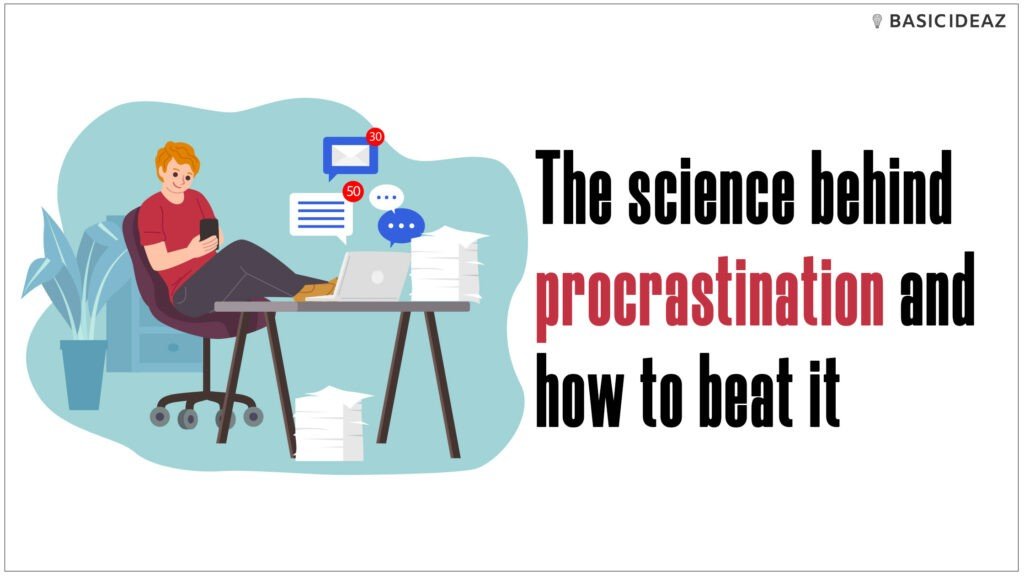
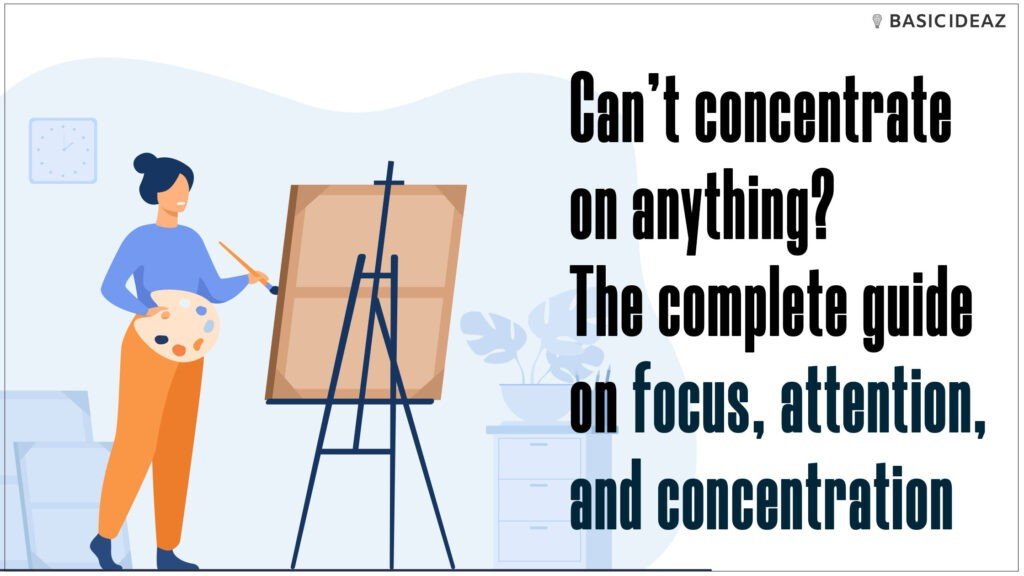



Pingback: How to Break Bad Habits Permanently | Freedom of Choice - Basic Ideaz